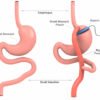It is estimated that 1 in 5 women will develop gallstones at some time in their life. The most likely candidate for gallstones is often described as ‘fair, fat and forty’.
What Causes Gallstones?
Gallstones are solid clusters of material that form in the gallbladder. They are made mostly of cholesterol. They may occur in one of three typical ways: (1) when bile contains too much cholesterol; (2) when bile contains an excess of certain proteins in the bile causing cholesterol to form hard crystals; or (3) when the gallbladder does not contract and empty its bile regularly. Western eating habits are also thought to encourage gallstone formation. This is because a low intake of dietary fiber and a high intake of highly refined food leads to a reduction in bile acid levels, which are needed to maintain the solubility of cholesterol.
Obesity Increases Risk of Gallstones
As weight increases, the risk for developing gallstones also rises. Health studies indicate that the risk may triple in women with a body mass index (BMI) greater than 32, compared to women with a BMI of 24 to 25. Risk may increase sevenfold in women with a BMI greater than 45 compared to those with a BMI less than 24. Evidence exists that central or abdominal obesity (excess fat around middle) leads to a greater risk of gallstones than does excessive fat on hips, buttocks and thighs.
Researchers have found that people who are obese may produce excessive levels of cholesterol. This can trigger gallstone formation.
Obese patients may also have large gallbladders that do not empty normally or completely. This, too, can trigger gallstone formation.
Yo-Yo Dieting Increases Risk of Gallstones
Yo-yo dieting, or weight cycling may increase the risk of developing gallstones. The more weight a person loses/regains during a cycle, the greater the risk of developing gallstones.
Diet to Reduce Risk of Gallstones
It is important to include some fat in your diet in order to stimulate gallbladder contracting and emptying. However, no more than 30 percent of your total calories should come from fat.
Studies have also shown that diets high in fiber and calcium may reduce the risk of gallstone development.
Increased intake of both soluble and insoluble fiber has been found to decrease the formation of deoxycholic, which increases the solubility of cholesterol.
Rapid Weight Loss Causes Gallstones
Paradoxically, losing weight too fast (3 pounds+ per week), typically triggers gallstone formation. To reduce the risk, aim for steady maintainable weight loss (eg. 2 pounds per week) and take regular physical exercise.
More About Severe Overweight
Causes of Obesity
Obesity Treatment Methods
Treatment of Morbidly Obese Patients
Obesity in Children
Abdominal Obesity Guide
Mild Obesity Guide
Morbid Obesity Guide
Malignant Obesity Guide
Super Obesity Guide










